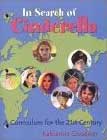
Cinderella:
345 Variants
by Marian
Roalfe Cox
SurLaLune's
Cinderella Area
SurLaLune Fairy Tales Main Page
316
Pitré, Fiabe, Novelle e Racconti popolari
Siciliani. (Bibl. Delle trad. pop. Sic., vol. iv.) Palermo,
1875. pp. 88-92. Variants of the above [No. 315].1
.
"IL PADRE SANTO"
(Polizzi-Generosa).
ABSTRACT
Merchant, leaving home with son, confides daughter to care of holy father. He afterwards calumniates her to father, who sends brother to slay her in wood. Brother spares her, and deludes father with dog's blood, which he drinks. Heroine taken care of by another holy father--Turkey-cock tells her that holy father will eat her; next day she replies that she is to be holy father's heir. At her wedding she is to give crown, apple, and ribbon to brother, an apple to father, and nothing to wicked holy father. She must throw her protector into heated furnace, from which she will then take baskets of crowns, apples, and ribbons--Happy marriage--Explanation--Villain Nemesis (wicked holy father is burnt).
TABULATION
(1) Merchant has boy and girl. Leaving home with son, he confides daughter to holy father, who misappropriates sum supplied for her maintenance, and shuts her in a cellar (solterraneo). -- (2) When father returns she is accused of evil practices, and he sends her brother out with her to slay her. Brother sets her free in the wood, slays a dog, and takes home its blood, which father drinks with ferocity.-- (3) Heroine betakes herself to the palace of another holy father, who befriends her, and makes her mistress of all his belongings. Beneath the palace is a turkey-cock, which, seeing heroine every day more beautiful, says:
"Lovely you are, and more lovely you'll grow,
And the holy father will eat you, I trow."
Heroine tells holy father, who bids her respond that she is to be the holy father's heir. Hearing this, the turkey-cock is silent.-- (4) Before celebrating the wedding, holy father bids her invite her father and brother and the wicked holy father; she is to give her brother a crown, an apple and a ribbon, as to the other guests; to give her father an apple only, and nothing at all to the wicked holy father. "On the first evening", adds the holy father, "you must throw me into the furnace heated for three nights and three days; a little while afterwards you will take out of it three baskets, of crowns, apples, and ribbons." All goes well, and when the father wants his daughter, who is unknown to him, to explain the diverse treatment of the guests, she tells her own story as that of another person, to the grief of her father, the trepidation of her brother, and the alarm of the wicked holy father.-- (5) When the truth is revealed the wicked holy father is burnt.
NOTES
Note 55
(P. 346.) In Imbriani (Nov. fior., No. xvii, "II Re Avaro"), the avaricious king forces his daughter to marry a thief who has tried to pass for a gentleman. Father is invited by his daughter to a feast, and given every dish without flavouring, whilst the other guests are praising the exquisite delicacies.
In a Hindoo variant, "The Princess who loved her Father like Salt" (Stokes, Ind. Fairy Tales, No. 23, p. 164), the heroine is abandoned in the jungle, where she is miraculously fed. Presently she reaches a place where the king's son is lying dead, his body stuck full of needles. She has pulled all of them out except those in the eyes, when she leaves a slave in charge whilst she rests. The slave disobeys injunctions, completes the task, and the prince comes to life again. He marries the slave, who pretends she has delivered him, and the heroine is degraded to slavery. The truth eventually comes to light, and the prince marries the heroine, whose parents are invited to the wedding.
In a Tyrolese version (Zingerle, Kinder- und Hausmärchen aus Tirol, No. 31) the youngest daughter gives the king a little salt as a birthday present, and is driven away. After a time she becomes her father's cook, and serves up his food without salt. This leads to the usual explanation and restoration to favour.
Pitré also refers to Storia della Regina Oliva
figliuolo di Giuliano Imperatore e moglie del Re di Castiglia, by
Foriano Pico. Naples, 17th cent.
Return to place in text.
Cox, Marian Roalfe. Cinderella: Three Hundred and Forty-five Variants of Cinderella, Catskin, and Cap O' Rushes, abstracted and tabulated. London: David Nutt for the Folklore Society, 1893.
While the original text of this book is out of copyright, the special formatting and compilation available on SurLaLune Fairy Tales is copyrighted. Be aware that while the original content has been honored, page numbering, footnote numbering, redesigned charts, links, and other aspects are unique to this site's version of the text. Use at your own risk. For private and fair use educational purposes only.
©Heidi
Anne Heiner, SurLaLune Fairy Tales
E-mail: surlalune@aol.com
Page last updated February 1, 2006
www.surlalunefairytales.com










